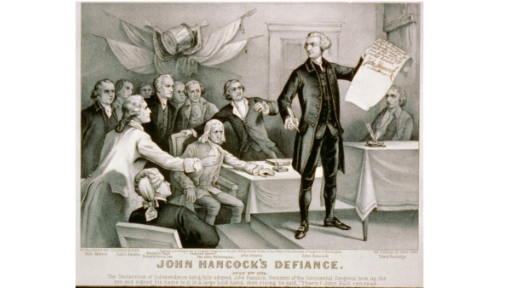“Here once the embattled farmers stood/And fired the shot heard round the world.” So wrote Ralph Waldo Emerson of the opening musket fire at the battles of Lexington and Concord on April 19, 1775. And so it could also be said of what transpired on July 4, 1776, when the embattled Colonists adopted their Declaration of Independence, whose words still reverberate around the world.
We hold these truths to be self-evident, that all men are created equal, that they are endowed by their Creator with certain unalienable Rights, that among these are Life, Liberty and the pursuit of Happiness.—That to secure these rights, Governments are instituted among Men, deriving their just powers from the consent of the governed…
The remarkable thing is that in asserting their rights vis-à-vis Great Britain, the Colonists spoke for all people everywhere and in every age. “To their everlasting credit,” observed historian Henry Steele Commager, “the Founding Fathers spoke for mankind” out of “a sense of obligation… to posterity” and “to the peoples of the world.” Pennsylvania delegate Benjamin Rush explained, “I was animated constantly by a belief that I was acting for the benefit of the whole world, and of future ages.” And writing from Paris where Franklin sought support for the American cause, he observed, “‘Tis a common observation here that our Cause is the Cause of all Mankind, and that we are fighting for their Liberty in defending our own.”
Equally remarkable is the sacrifice the Declaration’s signers were willing to make. As Paul Harvey noted, “Each knew the full meaning of that magnificent last paragraph… in which his signature pledged his life, his fortune and his sacred honor…. If they won this fight, the best they could expect would be years of hardship in a struggling nation. If they lost, they’d face a hangman’s rope.” But they signed. “And freedom was born.”
Now after nearly 250 years, for many of which it has been on public display, the hallowed document has become faded and worn. But the truths it proclaims have never waned. In Commager’s words,
The Declaration of Independence is not merely a museum piece. It is not a parchment to take out once a year, celebrate with ceremonial reverence, and then return to the sterility of a glass case. It is not merely an historical document, something to learn in school as we learn so many things that we promptly forget. It is vital and immediate. It argues a case that is still valid and announces principles that are still true. It still calls upon us to pledge our lives, our fortunes, and our honor to their vindication.
When Commager wrote this over fifty years ago (Freedom and Order, 1966), he could hardly have imagined the coming assault that would, as Gabriele Kuby said in 2016, employ “the art of deceptive speech” to seek the “destruction of freedom in the name of freedom.” Similarly in the 2020 report of the U.S. Commission on Unalienable Rights, its distinguished drafters decried the political agenda that “devalues core rights, and denies rights in the name of rights.” In 2021, Mark Levin wrote,
The counterrevolution to the American Revolution is in full force. And it can no longer be dismissed or ignored, for it is devouring our society and culture, swirling around our everyday lives, and ubiquitous in our politics, schools, media, and entertainment… We must rise to the challenge, as did our Founding Fathers, when they confronted the most powerful force on earth, the British Empire, and defeated it.
And the time to act is now, says Levin, as he quotes President Ronald Reagan.
Freedom is never more than one generation away from extinction. We didn’t pass it to our children in the bloodstream. It must be fought for, protected, and handed on for them to do the same, or one day we will spend our sunset years telling our children and children’s children what it was once like in the United States where men were free.
In 1776, fifty-six courageous men affixed their signatures—John Hancock’s being the first and largest—to the document Abraham Lincoln would call “a rebuke and a stumbling-block to tyranny and oppression.” The Declaration of Independence, now increasingly disparaged and the sacred freedoms it announces attacked, urgently needs preserving, protecting, and promoting. It is our turn to sign.
